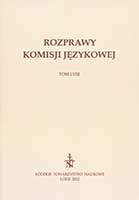Ukrainizmy, białorutenizmy i lituanizmy w Małym słowniku wyrazów obcych Michała Arcta z 1911 roku
Ukrainisms, Byelorutenisms, Lithuanisms in Michał Arct’s Mały słownik wyrazów obcych published in 1911
Author(s): Katarzyna WęgorowskaSubject(s): Language and Literature Studies
Published by: Łódzkie Towarzystwo Naukowe
Keywords: borrowing; lexicography; Ukrainisms; Byelorutenisms; Lithuanisms
Summary/Abstract: The draft is focused on the Ukraininisms, Byelorutenisms, Lithuanisms borrowings defined in a hundred-year-old dictionary by Michał Arct – one of the oldest Polish dictionaries of foreign words. The linguistic reflections concerns: a) ukrainisms: ataman, bajdak, bałachon, bezhołowie, braha, burzan, chaszcz, futor, hadiuka, harhara, harować, hołoble, hołubić, hołubiec, hołsz, homin, hoży, hramota, hulaszczy, hultaj, hurm, hurma, kacap, korowaj, kupała, kureń, kurzeń, kurhan, łoszak, łoszę, małż, mużyk, oczajdusza, oczeret, pantałyk, pereczotka, piernacz, pohybel, porohy, raby, trepak; b) byelorutenisms: ćwun, kałamaszka, odryna; c) lithuanisms: inkrutowiny, kurpie, litas, lit; d) indirect borrowings: czahary, czajka, czumak, czambuł, kucja, kutja, kniaź. Their characteristics supported by the linguistic-cultural findings permitted not only to highlight the evolution in usage of the borrowings from the Polish Eastern borderlands but also to indicate changes in the interpretation of the so-called ‘eastern’ foreign words preserved in Polish language .
Journal: Rozprawy Komisji Językowej
- Issue Year: 2012
- Issue No: 58
- Page Range: 353-362
- Page Count: 10
- Language: Polish

